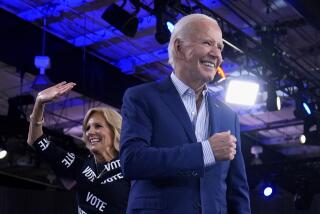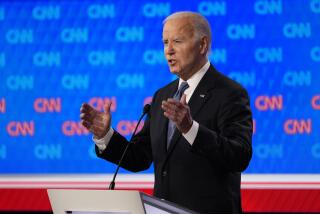Bush Takes New Tack; Debate Is Downplayed : Campaign: He calls Clinton a ‘novice,’ emphasizes plans for Baker to bring in new economic advisers.
- Share via
HOLLAND, Mich. — After a first-round debate performance that left even aides disappointed, President Bush’s return to the campaign trail Monday had the look of a refit designed to persuade disgruntled voters to give his campaign a fresh look.
Bush went to new lengths to portray Gov. Bill Clinton as a dangerous “novice” in foreign affairs, and the White House made it clear that Chief of Staff James A. Baker III would install a new team of top advisers to revamp the economic agenda that has proven Bush’s greatest political weakness.
Bush’s campaign appearances Monday were notable for their lack of any claim to victory in the Sunday debate. Even White House strategists conceded that Texas billionaire Ross Perot had turned in the strongest performance. But they held out hope that Perot’s renaissance might come at Clinton’s expense and could shake loose voters willing to give Bush another chance.
In a pre-dawn briefing for reporters only hours after the debate concluded, campaign chairman Robert M. Teeter insisted that a three-way race could help to “open up” the contest by nudging voters into “thinking again about who they’re going to vote for.”
After initially hoping that the first debate would bring about a much-needed breakthrough, the Bush campaign quickly shifted its attention to the two clashes that remain in a weeklong series in the hope of at least halving Clinton’s 10-point lead by early next week.
In a first step in that effort, Bush flew to the leafy Philadelphia suburb of Springfield to warn parents and children at a rally staged on a grassy hillside about the “risk” of handing the nation’s helm to a man of Clinton’s limited horizons.
“Gov. Clinton has absolutely no experience in international matters,” Bush charged, “and I am the President who has led the world and made our kids safer. And I ask for your support on that basis.”
The stark appeal was intended to highlight what may be Bush’s greatest asset and remains a significant Clinton shortcoming. While that advantage has been outweighed by public concern about Bush’s economic performance, the parallel hints about the composition of the economic team seemed intended to send an indelible message that a second term would be different.
Bush shrugged off a question Sunday night about who won the debate. He described the contest to his Pennsylvania audience as a “political talk-athon.” He added: “I don’t pretend to be an Oxford debater, but I think I did OK.”
But Monday night his campaign organization began to broadcast a new ad featuring man-on-the-street interviews with voters who praised Bush’s performance and expressed admiration for his presidential stature, while complaining that they could not trust Clinton. At the same time, Bush strategists abandoned self-congratulation for the new emphasis on the benefits of a turbulent race.
Notably, as he moved on from Pennsylvania to a rally at Hope College in Holland, Mich., Bush chose not to repeat the direct attacks on Clinton’s judgment and, by implication, his youthful patriotism that were a primary focus of his campaigning in the days leading up to the debate.
Clinton had rebuffed those assaults Sunday night by invoking the memory of Bush’s father, Sen. Prescott Bush, who stood up to Communist-baiting in the 1950s, and White House officials said they saw no benefit in pressing the issue again so soon after the debate.
Instead, Bush used both rallies to underscore his view that Clinton would pose a danger to the country across a wide range of issues. He suggested that the Democrat’s affection for trial lawyers and their agenda is tantamount to the “goo-goo eyes” relationship between Boris and Natasha in the old Bullwinkle cartoons.
In Springfield, he charged that Clinton’s call for a $150-billion tax increase made him “worse than Mondale, worse than Dukakis”--references to the last two Democratic presidential nominees.
More to Read
Get the L.A. Times Politics newsletter
Deeply reported insights into legislation, politics and policy from Sacramento, Washington and beyond. In your inbox three times per week.
You may occasionally receive promotional content from the Los Angeles Times.










